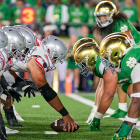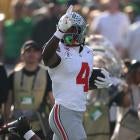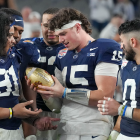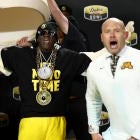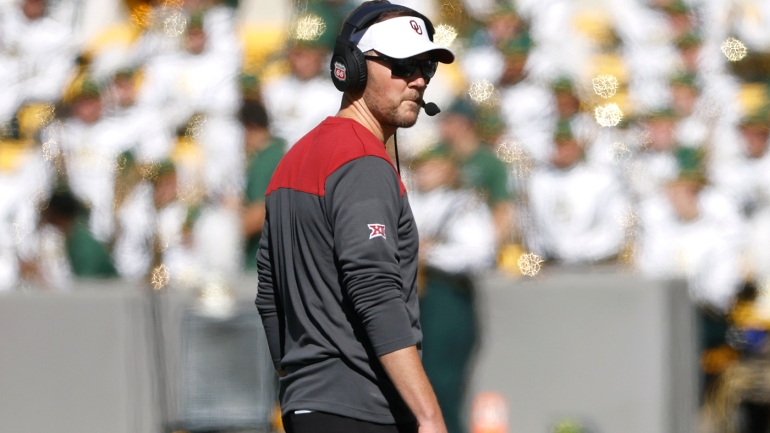
College football can't help itself. No matter how wholesome and endearing it can be at times, there is always a Sunday when a coach in the prime of his career can shake up the industry with the typical backdrop of millions of dollars, a desperate fan base, shifting loyalties and a chance to remake an entire conference.
Make that entire nation.
Lincoln Riley did that with a wave of his hand -- or whatever gesture he made -- in accepting the USC job Sunday. It was a shock wave felt from Baton Rouge, Louisiana, to Los Angeles with significant tremors still rumbling in Norman, Oklahoma.
Riley became the first Oklahoma coach to leave for another college football job since 1946. Every other Sooners coach since then had either retired, been fired or -- in the case of Jim Mackenzie -- died on the job. That's the definition of a destination gig.
Riley sort of used Oklahoma as a stepping stone. That's a necessary realization as Sooners faithful treat their wounds and attempt to heal their injured pride. But who can blame any 38-year-old -- in the prime of his career with the prospect of upward mobility -- for making such a calculated move? The difference is that, in the real world with a hedge fund maven or corporate real estate titan, they at least give two weeks' notice.
Riley looked around, considered that he had peaked at Oklahoma after five seasons, and said goodbye less than 24 hours after he had declared loyalty. Sort of. When Riley said after Saturday's Bedlam game that he wasn't going to LSU, no one considered whether that meant he could go somewhere else.
That's part of the shock. As long as Riley was in Norman, the Sooners were going to win Big 12 titles and challenge for the College Football Playoff. His continued excellence was a significant reason Oklahoma felt great about a move to the SEC.
The sense of, well, betrayal is palpable. Oklahoma athletic director Joe Castiglione took a risk in 2017, elevating Bob Stoops' 33-year-old offensive coordinator to replace the legendary coach. He paid Riley handsomely and gave him the resources he needed.
But there will be no sympathy for OU in this case, certainly in Big 12 circles. Karma is a witch when you consider Riley adapted the same secretive process Oklahoma used in jumping to the SEC. The knife in the back can twist both ways.
One of the best coaches in the game made a calculated decision. So calculated that there may now be an explanation why Riley mysteriously disappeared for "personal reasons" the Tuesday of the Baylor game. Regardless, it's now known Riley was talking to USC in the middle of the season while chasing a seventh consecutive Big 12 title and a playoff berth.
Protocol in such situations went out the window long ago. Riley ultimately made the choice between recruiting California kids to beat SEC teams -- he had three stud commits from the state in the No. 1-ranked Class of 2023 alone -- and recruiting in California to beat one Pac-12 team. That is Oregon, the current class of a league that has fallen from grace.
That had to figure in Riley's decision, too. If he gets the job done USC, it's simply going to be easier to win than it would be at Oklahoma or LSU. If Riley does it right, it's going to be easier to recruit in a 50-mile radius around L.A. than having to beat Texas and Texas A&M, now suddenly both SEC rivals, for Texas talent.
Those are big "ifs" -- huge "ifs", actually. No one said any of it makes total sense.
Riley looked out into the great wide open and took a chance as much as a job. USC is no sure thing, but it's a new thing. Riley joins a program with significant motivation to be good again.
LSU has to be kicking itself. AD Scott Woodward was apparently throwing around $100 million deals for the right coach to replace Ed Orgeron. Riley's name had bubbled up in the speculation. Now, 42 days after Coach O was fired, LSU is the last of three top-tier programs without a coach.
The money was going to be the money no matter where Riley ended up. Mel Tucker recently made sure that every coach of substance was going to get a raise after his $95 million deal with Michigan State. Riley chose his path picking a downtrodden 4-7 program that just fired its coach over a program in LSU that had won a national championship two years ago.
His decision creates arguably the best news for the Pac-12 in the last 10 years. Big ups to USC AD Mike Bohn, who hit an absolute home run. The man now has Luke Fickell (at Cincinnati) and Riley on his hiring record. New Pac-12 commissioner George Kliavkoff could be on the job for 20 more years and not get such a boost to his conference's football fortunes.
The league suddenly has a proven, young, accomplished commodity in charge of its flagship program. USC, and by extension the Pac-12, are on the road to becoming relevant again. The last time something like this happened to both conference and school, former AD Mike Garrett was hiring his fifth choice at USC, Pete Carroll. How'd that work out?
Riley is much more proven as a college coach than Carroll at the time, and he's taking the job at a much younger age.
There's something about the lure of the West Coast. The last, biggest such Power Five-to-Power Five move might be Lane Kiffin leaving Tennessee after a season for … USC. Sure, Kiffin had a history with the Trojans, but the point is this type of major job jump doesn't happen often. When it does, USC is usually involved.
The possibilities are endless. Does Riley bring Caleb Williams with him? Is there a transfer portal-palooza for departing Sooners now that their coach is gone?
Riley no doubt considered all of this before he made his calculated move. It changed two football powers, perhaps two conferences, and maybe, if it all goes right, the sport's national landscape.








